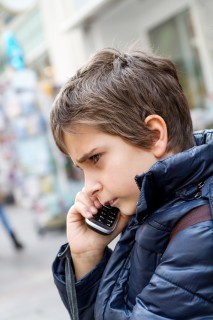Emergencies can be scary and intimidating for adults, and even more unnerving for children. But it’s important to prepare kids to take charge if no one else is around to help.
As a parent, you want to be there to protect your little ones from harm. However, an emergency situation might arise where they have to take the lead and call 911, like if you or a babysitter loses consciousness. You can create an family emergency plan and walk your children through what to expect and what they can do to help in an emergency. This will make them feel more prepared and comfortable. Hopefully, they will never be in a situation where they need to call 9-1-1, but it’s better to be safe than sorry. An estimated 240 million calls are made to 9-1-1 in the United States every year, according to the National Emergency Number Association.
Here are emergency basics to teach your children so that in an event of an emergency, these situations and key emergency personnel will be familiar to them:
What is an emergency?
An emergency is often defined as a situation or event that is sudden, usually unexpected and requires immediate, urgent action. Trying to explain this to a child may be difficult. To teach the difference between an emergency situation and a non-emergency, give examples. A fire in the house, an intruder and an unconscious family member are all emergencies. A stolen bike or lost pet is not.
Calling 9-1-1
 In the event of an emergency, teach your children to call 9-1-1. Also, prepare them for the questions they will be asked by the emergency operator, such as ‘Where are you calling from’, ‘What is your emergency’ or ‘Is the person awake and breathing’? It’s natural to be nervous in the event of an emergency, but being prepared for these questions will help.
In the event of an emergency, teach your children to call 9-1-1. Also, prepare them for the questions they will be asked by the emergency operator, such as ‘Where are you calling from’, ‘What is your emergency’ or ‘Is the person awake and breathing’? It’s natural to be nervous in the event of an emergency, but being prepared for these questions will help.
Make sure your child knows your address and that it’s important to give the operator as much information as possible; and to stay on the line until the operator says it’s okay to hang up. Tell them that the operator is there to help and that you trust them – this might help them open up to the stranger on the other end of the phone.
Who can help in an emergency?
Familiarize your children with the key emergency personnel in your community so they are prepared in the event of an emergency. These could be police officers, firefighters, paramedics, doctors, and nurses. It’s also a good idea to make sure your child knows what uniform each emergency worker might wear.
As part of your family emergency plan, list out all of the ‘in case of emergency’ contacts for your child and when they should call each number. Make sure they understand that 9-1-1 is always the best contact in an emergency but after the operator says they can hang up, it might be comforting to call mom/dad, aunt/uncle, grandma/grandpa.
Prepare for an emergency
You never know when an emergency situation might happen, but you can do your best to teach your children what to expect and how they can help in such an instance. You can also prepare for emergencies in these ways:
- Purchase a first aid kit: Put it where your child can reach it and talk through each of the contents and how to use them.
- Create a family emergency plan: Walk your child through a few scenarios that may require them to call 9-1-1. Print it out and put it somewhere easily accessible.
- Tell your children about any major medical conditions that the emergency personnel should be aware of, especially if it is an allergy to medicine: Include this information in the emergency plan and tell them if they can’t remember, just show the emergency plan to the EMT or police respondent.
- Write down important phone numbers: Whether it is community emergency numbers or a neighbor or family member, put it on paper and keep these on the fridge or close to your phone.
- Decide on and communicate a family exit strategy: For an emergency such as a fire, have a plan in place. Determine a meeting place that is a safe distance from the house.


